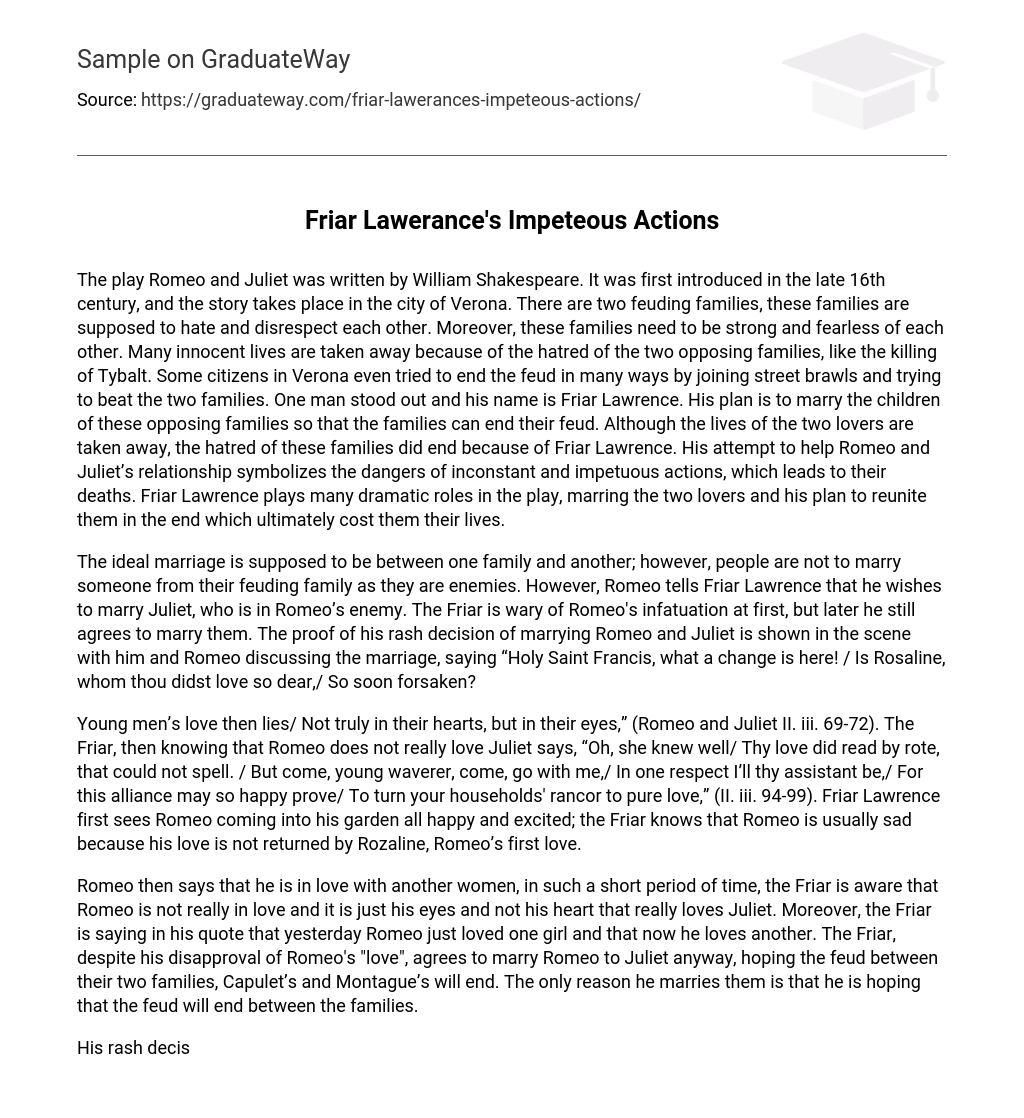The play Romeo and Juliet was written by William Shakespeare in the late 16th century, and is set in the city of Verona. There are two feuding families who are expected to despise each other and show no fear. This bitter hatred leads to the loss of innocent lives, such as when Tybalt is killed. The citizens of Verona even try various methods, including participating in street fights, to put an end to the feud. One man, Friar Lawrence, stands out from the rest. His idea is to bring together the children of these rival families in marriage, in hopes of bringing peace. Though Romeo and Juliet tragically lose their lives, Friar Lawrence’s intervention does indeed put an end to the families’ animosity. His actions in assisting their relationship serve as a warning about the dangers of impulsive and reckless behavior, ultimately resulting in their demise. Throughout the play, Friar Lawrence assumes multiple dramatic roles, marrying the two lovers and orchestrating their reunion in the end, which proves fatal for them.
The supposed ideal marriage is between two families, but it is frowned upon to marry someone from a family with whom you have a feud. Despite this, Romeo confesses to Friar Lawrence that he wants to marry Juliet, who belongs to his enemy’s family. At first, the Friar is skeptical about Romeo’s sudden infatuation, but eventually agrees to marry them. The evidence of his impulsive decision to marry Romeo and Juliet is evident in the scene where he and Romeo discuss the marriage, with the Friar exclaiming, “Holy Saint Francis, what a change is here! Is Rosaline, whom you loved so dearly, so quickly abandoned?”
According to Romeo and Juliet, young men’s love is not truly in their hearts but in their eyes (II. iii. 69-72). The Friar, aware of Romeo’s lack of genuine love for Juliet, comments that she understood well that Romeo’s love was superficial (II. iii. 94-99). Despite this, the Friar agrees to assist Romeo, hoping that their alliance will resolve the ongoing feud between their families (II. iii. 94-99). The Friar initially notices Romeo’s unusual happiness and excitement, as he is typically melancholic due to his unrequited love for Rozaline, his former flame.
Romeo declares his love for another woman shortly after claiming love for Juliet. The Friar realizes that Romeo’s love for Juliet is superficial, originating solely from his eyes rather than his heart. Despite disapproving of Romeo’s affection, the Friar agrees to marry the two, hoping that their union will reconcile the feuding Capulet and Montague families.
The Friar’s rash decision to marry the two lovers, despite good intentions, is the first step towards their tragic fate. Being from feuding families and with their marriage kept a secret, this only brings Romeo and Juliet closer to death. The dangerous plan devised by Friar Lawrence to reunite them ultimately makes him responsible for their demise. Following Romeo’s banishment from Verona for killing Tybalt, a member of the opposing family, Juliet’s parents are unknowingly arranging her marriage to Paris, unaware of her secret marriage to Romeo.
Juliet visits Friar Lawrence and threatens self-harm, blaming him for causing the problem. Aware of Juliet’s intentions, the Friar makes a sudden decision and advises her to drink a vial of poison. He explains that the poison will make her appear dead and she will be taken to the Capulets’ ancient vault. He also plans to send a message to Romeo, informing him of the plan and advising him to meet them in Mantua.
According to Romeo and Juliet (IV. i. 95-120), Friar Lawrence must act swiftly to prevent Juliet’s suicide and restore her honor. He advises Juliet to consume the poison he is providing and feign her death. This will deceive everyone into believing she has passed away. Meanwhile, Romeo will receive a letter informing him of Juliet’s continued existence. With this news, he will return to Verona and flee with Juliet, leading to their blissful future together.
The Friar failed to thoroughly consider and anticipate the potential mistakes that could arise from his plan. Juliet, left with no alternative but to comply with the Friar’s plan, “dies”; however, due to the Friar’s impulsive planning, he overlooks any potential complications – Romeo does not receive the letter and mistakenly believes Juliet is truly deceased. The Friar’s plan proves unsuccessful, resulting in Romeo hurrying to be with Juliet and taking his own life, while Juliet awakens later to find Romeo dead and ultimately takes her own life as well. The rash and hasty decisions made by the Friar led to the tragic demise of the two innocent lovers.
Friar’s Lawrence’s impetuous and rash actions play a significant role in the story. These actions not only trigger the sequence of events that lead to the resolution of the play but also contribute greatly to the chain of events resulting in Romeo and Juliet’s untimely demise. Had Friar Lawrence taken more time to consider his choices, it is possible that the tragic deaths of Romeo and Juliet could have been avoided. Additionally, Friar Lawrence’s influence shapes the development of other characters in the story. Lastly, by marrying Romeo and Juliet, the Friar provides them with an opportunity to “develop” their characters.





